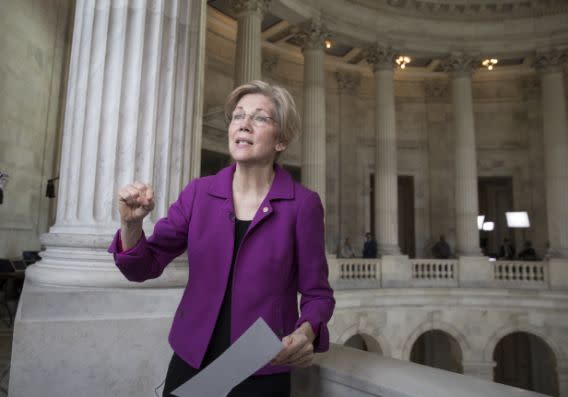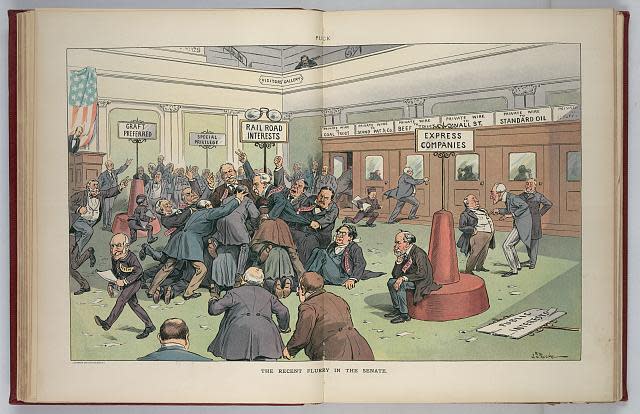The origins of Rule 19: How a 1902 fistfight silenced Elizabeth Warren in 2017
Republicans invoked an obscure Senate rule to silence Sen. Elizabeth Warren, D-Mass., while she was delivering a scathing critique of her colleague Sen. Jeff Sessions, R-Ala.
Warren quoted a letter by the late Coretta Scott King, the widow of civil rights leader Martin Luther King Jr., and the late Sen. Ted Kennedy, D-Mass., opposing Sessions’ nomination to a federal judgeship in 1986. King had said that Sessions used his power as an acting federal prosecutor in Alabama to “chill the free exercise of the vote by black citizens,” and Kennedy had called him a “disgrace to the Justice Department.” Sessions’ nomination was voted down in committee.
Warren was resurfacing these accusations during her argument that he should not be confirmed as President Trump’s attorney general.
Majority Leader Mitch McConnell, R-Ky., interrupted Warren midway through her reading King’s letter and accused her of violating Senate Rule XIX. Senators voted along party lines to silence Warren, turning a national spotlight on what had been a routine critique by one of the Trump administration’s most outspoken opponents. #LetLizSpeak started to trend on social media.
Though senators have said worse about their colleagues, Warren did in fact violate section two of Rule XIX: “No Senator in debate shall, directly or indirectly, by any form of words impute to another Senator or to other Senators any conduct or motive unworthy or unbecoming a Senator.”
On Wednesday morning, Warren said that she went to the Senate floor to fulfill her constitutional responsibility — debating whether Sessions should be the nation’s next attorney general.

Yahoo Global News Anchor Katie Couric asked Warren why she thought the rule was applied to her in this instance.
“I think it’s because they didn’t want anyone to read Coretta Scott King’s letter. This is a powerful letter,” Warren replied.
Where did Rule XIX come from anyway?
Like the nation itself, the rules governing the Senate have evolved over the years. In 1801, then-Vice President Thomas Jefferson published rules dictating the behavior and procedures of senators in “A Manual of Parliamentary Practice,” and new rules have been added or taken away in the years since.
In February 1902, roughly a century after Jefferson’s manual appeared, a fistfight on the Senate floor between Sen. John McLaurin, D-S.C., and his old mentor Sen. Benjamin Tillman, D-S.C., compelled the Senate to create the rule that was used to silence Warren.
According to Senate historians, Tillman, 54, pointed to McLaurin’s empty chair in the Senate chamber while accusing his former protégé of treachery for succumbing to “improper influences” in collusion with Republicans. McLaurin, 41, who was in a nearby committee meeting, was told of the remarks and sprinted into the chamber, where he upbraided his old friend for telling “a willful, malicious and deliberate lie.”

Tillman lunged at McLaurin, and misdirected blows struck several other senators who were trying to pry them apart. Senate historians say it was the first physical assault in the chamber since 1850.
In August 1902, Senate members adopted stricter guidelines concerning the decorum of floor debates: sections two and three of Rule XIX.
The rule in question is so rarely enforced that it’s a challenge to find examples.
Bloomberg reporter Greg Giroux surfaced a moment in 1979 when Sen. John Heinz, R-Pa., invoked Rule XIX after Sen. Lowell Weicker, R-Conn., called him “an idiot” and “devious.” Ultimately, Weicker was not silenced because Majority Leader Robert Byrd (D-W.Va.) successfully eased tensions and had them shake hands.
Giroux also dug up a time in 1964 when Sen. Clifford Case, R-N.J., invoked the rule against Majority Leader Mike Mansfield, D-Mont. Presiding officer Ted Kennedy rejected the request.
Amber Phillips of the Washington Post compiled several other moments in recent history where Rule XIX arguably could have been invoked or enforced but was not: then-Senate Minority Leader Harry Reid calling Republican senators “puppets” controlled by then-President George W. Bush in December 2007, Sen. Ted Cruz, R-Tex., accusing Mitch McConnell, R-Ky., of lying to him in July 2015; and Sen. Tom Cotton, R-Ark., disparaging the “cancerous leadership” of Reid in May 2016.
James Grimmelmann, a professor of law at Cornell Tech and Cornell Law School, told Yahoo News that the enforcement of Rule XIX against Warren reminds him of the House “gag rule” of 1836 that forbade the House of Representatives from considering petitions from abolitionists.
“There’s no direct link, but the disuse of it is eerily reminiscent of the gag rule,” Grimmelmann told Yahoo News. “In both cases, you have such a sensitivity and defensiveness on the part of some members of the institution around the subject of race that they are willing to silence their colleagues rather than risk hearing things they don’t want to hear.”
Former President John Quincy Adams, who was back in Congress as a representative of Massachusetts, adamantly opposed the gag rule as a “direct violation” of the Constitution and a restriction on free speech. He finally gathered enough votes to repeal the resolution in 1844.
Liberal politicians have rushed to Warren’s defense. Sen. Chris Murphy, D-Conn., for instance, argued that senators would need to address Sessions’ character in a discussion regarding his suitability for being attorney general. Sen. Bernie Sanders, I-Vt., said it is “outrageous” that King’s words would be deemed inappropriate for the Senate.
That's the key point. Rules against criticizing other Senators cannot apply when you are DEBATING THE NOMINATION OF A SENATOR! https://t.co/mLQqP7z14d
— Chris Murphy (@ChrisMurphyCT) February 8, 2017
Republican senators silencing @SenWarren because she quoted a letter from Coretta Scott King in opposition to Jeff Sessions is outrageous.
— Bernie Sanders (@SenSanders) February 8, 2017
Proud to read the words of #CorettaScottKing on the floor for Sens & the American people to hear. We will not be silenced. cc: @SenWarren https://t.co/6WNvTkK1Ch
— Sherrod Brown (@SenSherrodBrown) February 8, 2017
Read more from Yahoo News:



